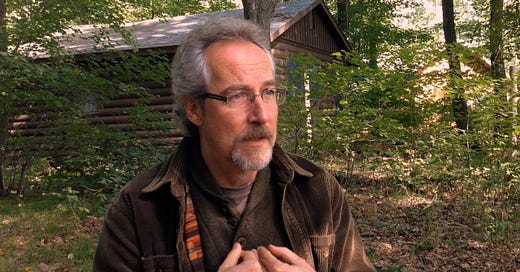We want to resist the monochrome, the one dimensional conditioning that flattens us into caricatures of our full bodied selves.
We’re conditioned to fit in, to behave, to become average. The request is, “let me be normal.” Well the norm is to be mediocre. The norm is to be in the middle. The soul did not come here for that.
The soul came here to be eccentric — out of the center. It came here to live on the margins of its life, on the frontier, on the edges of its life. That’s part of what initiation is about. The soul came here for full participation. It seems to be quite insistent on a full display of its plumage, of its color, of its voice, of its character, and the soul, as we may have noticed, you may have noticed, cannot be domesticated.
Every message we get in the culture is to be domesticated, to silence our wildness, to turn passive, to acquiesce, to be quiet, and the soul will not do that. If we agree to that message to be quiet, to be passive, to be silent, the soul will visit us with trouble. It’ll bring depression, it’ll bring anxiety, it’ll bring addiction.
It’ll bring something to stir us into some type of response to what is going on. The soul would love us to protest. As James Hillman once said, the sure sign that the soul is awake is that it’s outraged. And we have plenty to be outraged about right now.
My intention is to foster that internal sense of resistance and to fight living a conscripted life, to find a way to feed the fidelity of the call to soul. And I wanna track soul’s movements to see how it persists in bringing us to the thresholds of initiation again and again.
Even in the absence of formal cultural initiations, it seems like everything conspires to bring us to the edge of our own ripening. Even if we’re not participating in the process.
I want us to explore what I call suspended initiation. Many of us have gone through events in our lives that were profound, they were powerful, and they brought us down the road closer and closer to the threshold of our own adulthood. But then something stopped it, and these initiations are suspended. They’re not complete.
I think what I see out in the culture right now is there are many, many, many people, no matter what age are parading as adults, but are truly carrying out the behavior patterns of very, enraged adolescents.
RD Lang said, “We’re born as Stone Age children,” which means we arrive here carrying all of what our deep time ancestors experienced and knew. They knew how to do what we’re talking about. They knew how to be in community. They knew how to deal with loss and grief. They knew how to do deal with gratitude and thanksgiving. They knew how to do initiatory practices to bring their youth from a troubled circumstance into a seasoned adulthood.
What they also knew how to do was to take the raw heat of adolescence and cook it into something quite elegant and beautiful. We call it juvenile delinquency. We try to stop it. We try to suppress it. We try to silence it, and it is the beauty of these young men and women who are burning inside that we don’t see that fire. We don’t give them a way in which to cook that, use that heat to cook their own souls into something magnificent.
However, I think what we have to really honor is the fact that the moment we begin looking in the territory of initiation, we are looking into a gaping hole. And in other words, we could say that what we have to do first is honor the sorrow that comes into this territory. There’s tremendous grief here that if we really acknowledge what has happened for the past several hundred years or more, when we began to abandon both village life and initiatory practices. What happened to the integrity of the community and what happened to the integrity of the land?
We could weep for centuries over this profound loss of initiatory practices for our communities. Is that clear what I’m saying? So those of you who are familiar with my work about that, this is the fourth gate of grief, what we expected and did not receive.
We’re wired to expect something to come toward us.
When our own internal fire began to cook in our early teens, mid-teens, we expected someone to notice that and say it’s time. “It’s time.” Not to silence that, but to give it a place to be, so that those who come through the other side of that gate can now stand in the community as worthy and potent adults, young adults.
Francis will be joining me on Howl in the Wilderness soon. Become a free member to get notified of all new episodes, and become a patron to gain early access to ad-free episodes and the full podcast archives.
http://patreon.com/c/howlinthewilderness






Dig it!